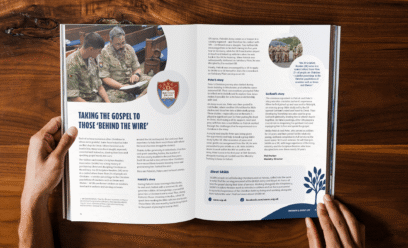Book review: Who God Says You Are

The new edition of our theological journal Foundations has just been published. Download the whole issue in pdf format here or read online here. One of the articles is a review by Tom Creedy of ‘Who God says you are’:
Who God Says You Are: A Christian Understanding of Identity, Klyne R. Snodgrass, Eerdmans, 2018, 240pp.
The author, an emeritus professor of New Testament, has written what is probably my new favourite book on identity from a Christian perspective, that invites us to consider both the radical value of every human being, and how we can become more human by becoming more like Jesus.
Drawing on the Bible, classical sources/context, and related traditions, as well as being open to the insights of the sciences, Snodgrass beautifully explores the different things that make us, us, pushing the reader back to Jesus and forward into the future. The Image of God is central, though not fully unpacked, and Snodgrass moves beyond the various debates about body/spirit/soul etc., arguing for a more holistic understanding of identity. Practically speaking, this is a positive book – one that says a number of things constructively, rather than negatively.
The bulk of Who God Says You Are (both book and idea!) is bound up in the author’s nine factors:
i) You Are Your Body – Snodgrass sagely and biblically returns our human form to a central place in understanding who we are. We might be “more than” a body, but we are certainly not less. My only quibble would have been to be even stronger on this, particularly with respect to disability theology and the Image of God.
ii) You Are Your History – this is a really interesting chapter that challenged me, and encouraged me to think more carefully about the way our stories shape us, and the stories of those who preceded us both biologically and generally.
iii) You Are Your Relations – this was a superb chapter explaining how our capacity and reality of relationships has a profound impact on who we are and who we will become; “Our relations both affirm who we are and draw us out of ourselves… You cannot be who you are without the community around you, and they need you to become the people they should be”.
iv) You Are Your Mind – noting that this comes after the stuff on body, this is a helpful chapter reminding us of the importance (though not ultimate importance) of the mind in making us who we are.
v) You Are Your Commitments – this is a surprising but really helpful chapter, which resonates with some of James K. A. Smith’s work.
vi) You Are Your Actions – this chapter is not saying that “actions maketh man” (to misquote the film Kingsman!) but does stress the import-ance of habit and action in forming identity.
vii) You Are Your Boundaries – echoing the limitations of being human that being made in the Image of God imply (and vital for understanding both our embodiment and our relational capacity – we are limited) this is a genuinely brilliant bit of theology.
viii) You Are an Ongoing Process of Change – as someone wary of change, I found this chapter both challenging and encouraging, not least because of the chapter that follows it. Snodgrass writes, “The truth is, you are more than you presently are, and God wants you to be more than you presently are… All of us know sin, failure, and limitation, but you are more than your sin, your failures, and your limitations…” Amen!
ix) You Are Your Future – this penultimate chapter is brilliant. I loved the way Snodgrass links the importance of God’s Kingdom to our own identity formation: “Jesus and the early church taught that the future has invaded the present and determines how life in the present is lived. Christians live in the presence of the future”. Amen!
The nine factors are bookended with a helpful introduction exploring the importance of faith in understanding identity, and an invitation “That You Become a Person” which rounds out the book. At the time of writing (halfway through 2019, with an MA Dissertation and a number of conference papers on human identity in theological perspective under my belt) it is not hyperbole to say that this is now the single book I would most widely recommend to leaders and thoughtful Christians on the subject of being human and discovering our identity. In a local church, this book could form a helpful basis for a course on identity, perhaps alongside more popular-level books such as Graham Beynon’s Mirror Mirror (IVP) or Mark Meynell’s What makes us human? (The Good Book Company). Who God Says You Are is really that good!
Thomas Creedy, Theologian at Large, South West London Vineyard
Stay connected with our monthly update
Sign up to receive the latest news from Affinity and our members, delivered straight to your inbox once a month.



